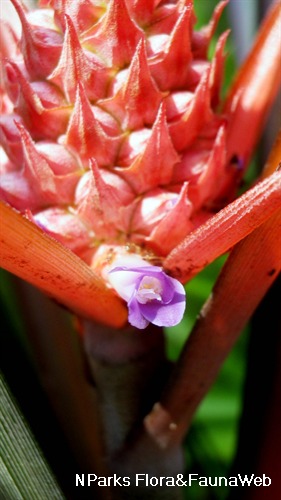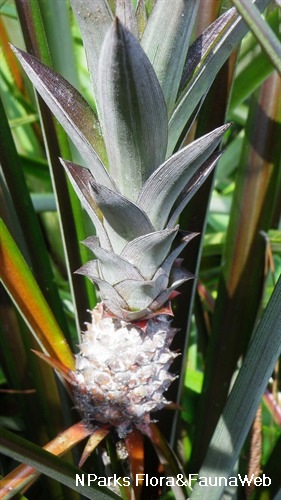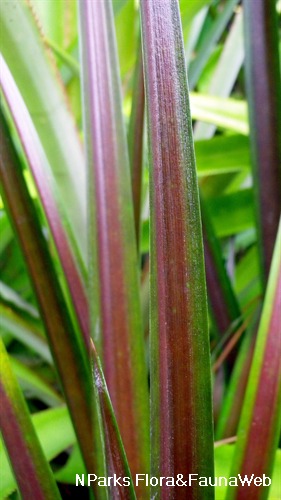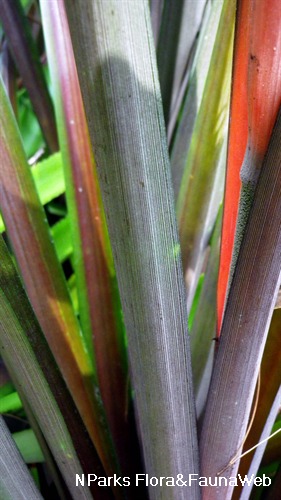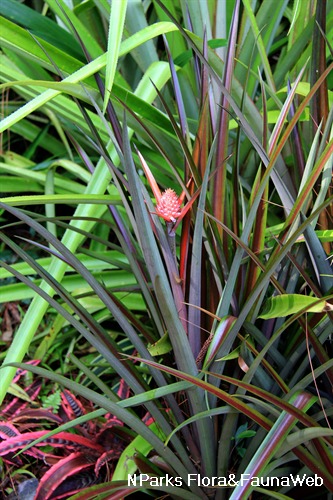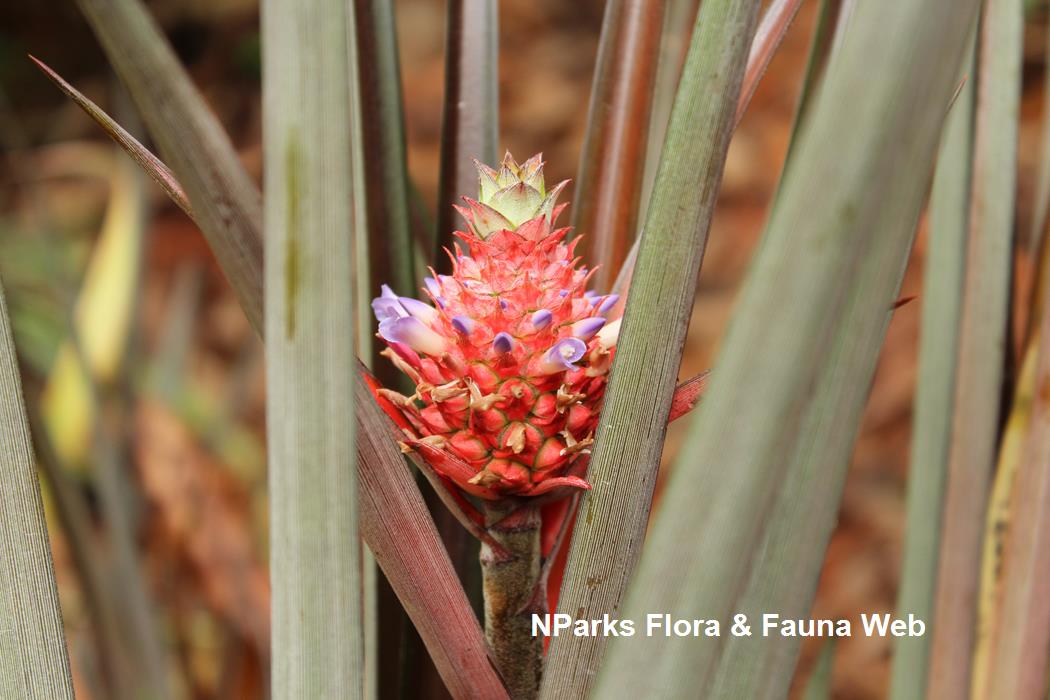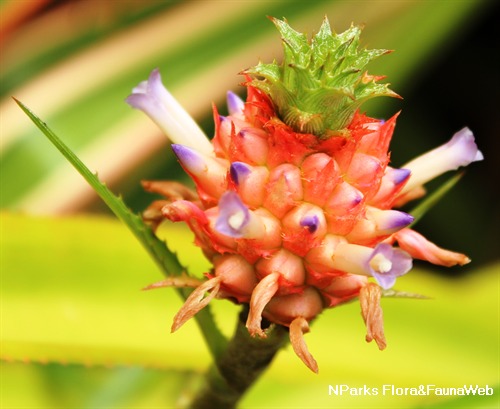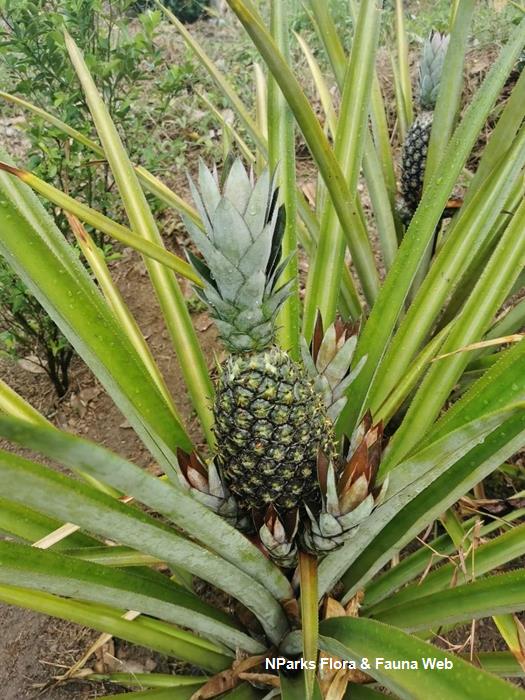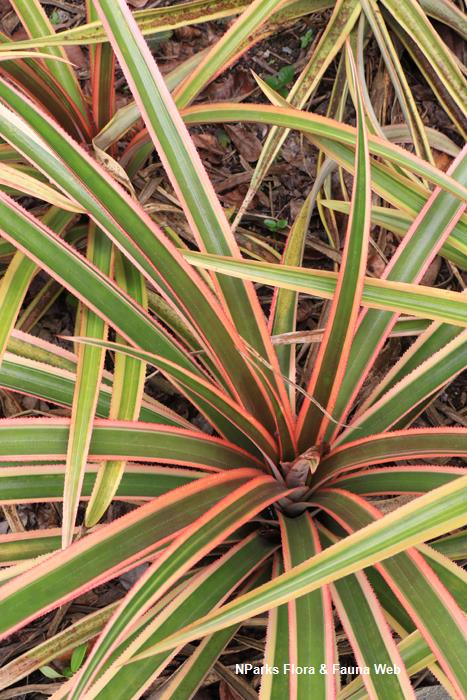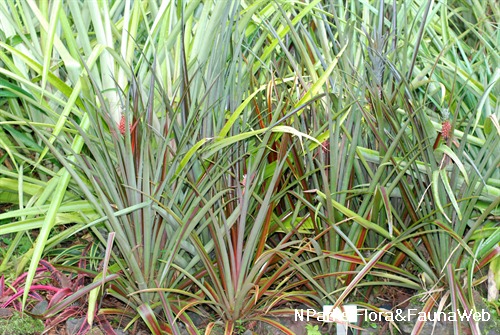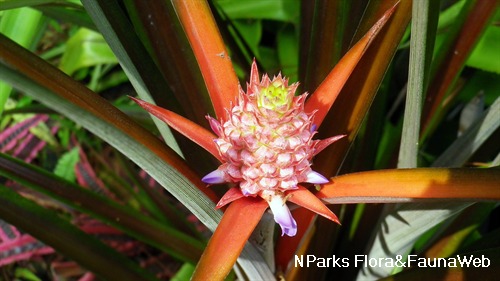
Name
Classifications and Characteristics
| Plant Division | Angiosperms (Flowering Seed Plants) (Monocotyledon) |
|---|---|
| Plant Growth Form | Herbaceous Plant |
| Lifespan (in Singapore) | Perennial |
| Mode of Nutrition | Autotrophic |
Biogeography
| Local Conservation Status | Non-native (Horticultural / Cultivated Only) |
|---|
Description and Ethnobotany
| Growth Form | It is a terrestrial bromeliad, growing up to 1 m in height |
|---|---|
| Foliage | The leaves are linear, measuring up to 1 m long by 4 cm wide, with margins either spineless or armed with sharp prickles towards the leaf tips. The upper surface is smooth, light olive green with a dull, reddish-brown median stripe, while the lower surface is covered with a layer of bluish-grey trichomes. |
| Flowers | The inflorescence is a globose spike, up to 5 cm across, with bright pink floral bracts subtending each flower. The flower consists of bright pink sepals and white petals suffused with purple on the upper one-third (towards the tip). |
| Fruit | The fruit is a sorosis. |
| Taxonomy | This red-leaved cultivar of Ananas lucidus was bred for the European market. |
| Etymology | The genus Ananas is derived from the Tupi-Guarani vernacular name for the fruit of Ananas comosus. |
| Ethnobotanical Uses | Timber & Products: The plants are cultivated on a local scale to harvest 'Curagua', a cream or white-coloured fibre used to make clothing and strings, as well as in weaving. |
Landscaping Features
| Desirable Plant Features | Ornamental Flowers, Ornamental Foliage, Ornamental Form |
|---|---|
| Landscape Uses | Focal Plant, Container Planting, General |
| Thematic Landscaping | Bird & Wildlife Garden |
| Usage Hazard - Cons | Spines/Thorns - Flower, Spines/Thorns - Leaf |
| Usage Hazard - Cons Remarks | Spines/Thorns (Leaf/Flower): The leaves and inflorescence are covered in spines. Keep children and pets away from the plant to avoid injury. |
Fauna, Pollination and Dispersal
| Pollination Method(s) | Biotic (Fauna) |
|---|---|
| Seed or Spore Dispersal | Biotic (Fauna) |
Plant Care and Propagation
| Light Preference | Full Sun, Semi-Shade |
|---|---|
| Water Preference | Moderate Water |
| Rootzone Tolerance | Drought Tolerant, Well-Drained Soils, Fertile Loamy Soils, Easy to Grow |
| Pruning | Wear gloves/ other protective gear when carrying out pruning/ maintenance as plant can be prickly. |
| Pest(s) | Sucking Insects |
| Propagation Method | Sucker, Division |
Foliar
| Foliage Retention | Evergreen |
|---|---|
| Mature Foliage Colour(s) | Brown, Green, Red |
| Mature Foliage Texture(s) | Leathery, Spiny / Bristly / Stinging, Thick |
Floral (Angiosperm)
| Flower & Plant Sexuality | Bisexual Flowers |
| Flower Colour(s) | Green - Light Green, Pink, Purple, Red, White |
|---|---|
| Flower Grouping | Cluster / Inflorescence |
Fruit, Seed and Spore
| Mature Fruit Colour(s) | Brown, Yellow / Golden |
|---|---|
| Mature Fruit Texture(s) | Powdery / Waxy Bloom, Thorny / Spiny |
Image Repository
Others
| Master ID | 31544 |
|---|---|
| Species ID | 5943 |
| Flora Disclaimer | The information in this website has been compiled from reliable sources, such as reference works on medicinal plants. It is not a substitute for medical advice or treatment and NParks does not purport to provide any medical advice. Readers should always consult his/her physician before using or consuming a plant for medicinal purposes. |

